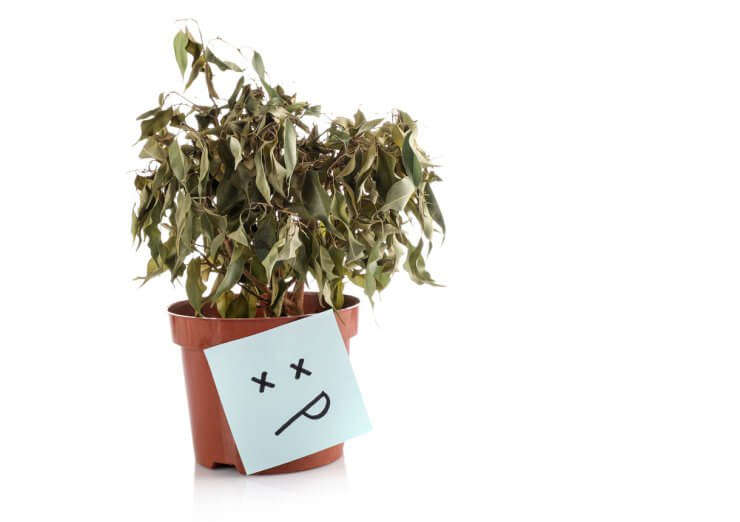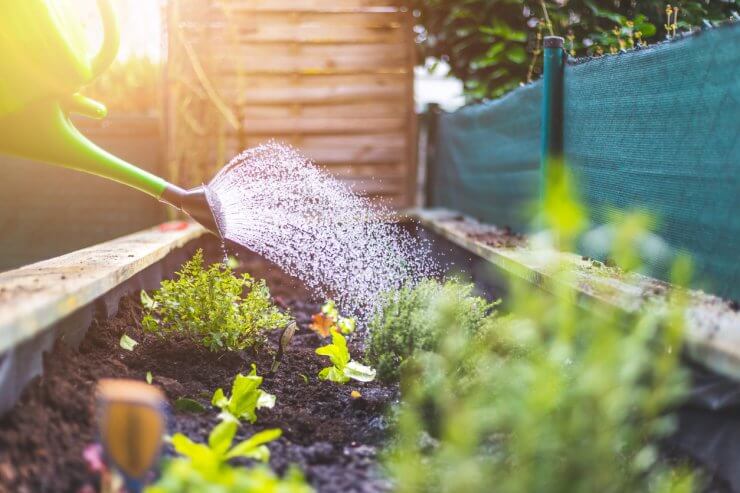
Droopy under-watered plants, yellow over-watered plants, is there any balance when it comes to gardening? Basil, my most beloved herb, is notoriously famous for telling me that I love it just a little too much with its sad yellow leaves. Meanwhile, my pathetic parsley is looking at me, saying feed me!
If your goal is not to kill everything in your garden, you probably ask the same question, as I often do, which is “how often should I water my plants in the heat of summer?” Ideally, most vegetables have been planted long enough to form some good roots to withstand the heat by the time the hotter summer months hit, but you certainly can’t rely on mother nature alone to feed your veggie babies.
Discover 7 top tips for growing, harvesting, and enjoying tomatoes from your home garden—when you access the FREE guide The Best Way to Grow Tomatoes, right now!
How often should I water my plants? Here’s your guide to summer watering for a killer garden.
The great thing about gardening secrets is that they aren’t very well-kept. When I first started gardening, I felt like I was always texting photos of my plants to my gardening friends, asking if my plants were overwatered, or underwatered, and got no shortage of stories, knowledge, experience, and even some science.
Before we get into the details, though, I have to give you some disappointing news: There is no set rule on watering plants. There are simply too many factors that play into the answer, from the type of soil you have, to the weather, to how established your garden is. That’s not to say there aren’t some good pointers out there. Here is what I’ve learned over the years.
- Plan your garden. Plan your garden in a way that groups dry-climate plants together and water-loving plants together. For example, rosemary and thyme come from drier Mediterranean climates, so don’t require as much water. Tomatoes, on the other hand, love, love, love water.
- Containers need lots of water. The soil in containers heats up and dries out much faster than the soil in the ground, so if you have a container garden, keep a close eye on them. You may need to water them twice a day in the height of summer.
- Pay attention to the weather. Plants get hot and thirsty just like we do. Hotter, drier weather will mean you need to water more often.
- Pay attention to the plants. Here’s where it might get a bit tricky. Some plants wilt and droop when they need water. You water them and they perk right back up. Others (tomatoes are a good example) don’t like these games. Split tomatoes happen because the plant dries out, then grows rapidly when they get water.
- Look at your soil. Does it look and feel dry? That’s a clear indicator that it’s time to water.
- Take advantage of mulch. A layer of mulch helps keep the soil moist, while still allowing airflow. Not just any mulch, though, as most bagged kinds are treated with chemicals. Some natural mulch includes hay, grass, leaves, and even pine needles. In fact, at my summer cabin in Vermont, I keep a small garden there too, and at first, I was annoyed that it was constantly covered in pine needles until I learned that pine needles help make the soil acidic, and plenty of my favorite veggies like acidic soil, like tomatoes, carrots, pumpkins, sweet peppers, cucumbers, cauliflower, and even garlic.
- Water more, less frequently. Most plants will grow deeper, stronger roots when you give them more water, but less often. Unless it’s especially hot, you may only need to water every two or three days this way.
- Try not to get the leaves wet. Damp leaves are an invitation to mold and disease. As much as possible, try to keep your watering to the ground so the roots get all that good, cool water. (Although some water to clean dust and dirt from the leaves is a good idea.) If you notice burned leaves, this can also happen from watering while the sun is out, the droplets on the leaves can magnify the heat of the sun.
- Water appropriately. Here’s a general rule of thumb: Larger and younger plants need more water. More established plants with deeper roots can get by with less.
- Water in the morning. If you water in the heat of the day, there’s a good chance the water will evaporate before it can really soak into the soil. By watering before the sun is at its most direct, you can water more efficiently, and any water on the leaves will have time to evaporate.

How often should I water my plants? Don’t miss this bonus tip
Water after it rains! Yeah, I know. The first time I heard this I was suspicious. Here’s the thing, if you only get a little bit of rain, and especially if the sun comes out afterward, that water won’t really soak in deep enough to offer many benefits. Take advantage of the already damp soil and add to it. Obviously, this doesn’t apply if you have a full day or weekend of rain, and watering at night is just asking for rot, so avoid that too.
How often should I water my plants? Do these seem like good tips or would you add something? Share your ideas in the comments. Discover 7 top tips for growing, harvesting, and enjoying tomatoes from your home garden—when you access the FREE guide The Best Way to Grow Tomatoes, right now!





Using water that’s had grass cuttings soaking in it works great for me!
My grandfather grew prize winning tomatoes in Winnipeg, Manitoba. He was careful to only use water that he kept in a barrel that he had allowed to warm up by the sun.